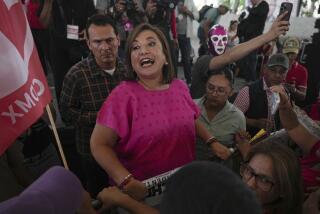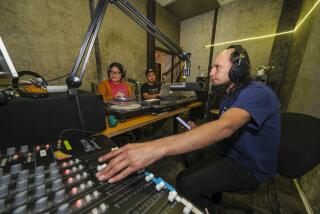U.S. Gets Ready for Likely Sandinista Election Victory
- Share via
WASHINGTON — The Bush Administration, while maintaining publicly that the U.S.-backed opposition has a good chance to win Sunday’s election in Nicaragua, is quietly preparing for an outcome most officials consider more likely: a victory by the Sandinista government.
If the leftist Sandinistas win the vote by a significant margin, it would constitute a direct repudiation of almost a decade of U.S. policy toward Nicaragua, which has been built on the premise that the regime is hated by a majority of its citizens.
“What do we do if the Sandinistas really do win a free and fair election?” a State Department official asked Friday. “In a sense, it’s our worst-case scenario.”
No matter who wins, however, the election will mark a turning point in Washington’s agonizing struggle to tame Nicaragua since the Central American nation’s 1979 revolution. After an initial attempt at cooperation under President Jimmy Carter, the United States, under President Ronald Reagan, spent eight years trying to overthrow the Sandinista regime by arming and directing a rebel army, the Contras.
Today, the Contras, blocked by Congress from further military aid, are divided and demoralized. President Bush, who supported the Reagan Administration’s decision to arm them, has tacitly accepted the defeat of that strategy.
Instead, the Bush Administration has focused virtually all its energy on Nicaragua into pushing for a free election Sunday and promising to recognize the winner. That strategy was initially based on the assumption that, with Nicaragua’s economy a shambles, the Sandinistas and their presidential candidate, incumbent Daniel Ortega, could not possibly win a fair contest.
Now that it appears that the Sandinistas may well win, and that international observers, including Carter, may declare their victory legitimate, the Administration has prepared a new policy to deal with the consequences.
Essentially, the new strategy will be one that the Reagan Administration explicitly rejected: offering the Sandinistas normal relations, including an end to the five-year-old U.S. trade embargo--but only if the Managua government stops its aid to leftist guerrillas in neighboring El Salvador and establishes full democracy inside Nicaragua.
“It’s very important that, before we talk about normalizing relations with that government, that we see a sustained period of good behavior in terms of . . . shipping arms and weapons to the insurgency in El Salvador,” Secretary of State James A. Baker III told the House Foreign Affairs Committee this week.
In a statement issued Friday, State Department spokeswoman Margaret Tutwiler set out even broader requirements for the Sandinistas to meet. “An improvement in relations after the election depends on the new Nicaraguan government’s full compliance with its . . . commitments to install and adhere to democratic institutions and freedoms; to promote national reconciliation; and to cease support for regional insurgencies,” Tutwiler said.
“We have no doubts of UNO’s readiness to carry out these commitments,” she added, referring to the opposition coalition, the National Opposition Union, whose candidate is Violeta Barrios de Chamorro. “We remain skeptical regarding the Sandinistas because of their repeated failure to keep commitments they have made.”
Officials pointed out that those imprecise guidelines will allow the United States to do almost anything it wants after the election. On one hand, they said, the Administration could recognize a Sandinista victory but maintain--or even increase--U.S. economic and political pressure on the regime. At the same time, it can dangle before the Sandinistas the lures of normalized political relations and an end to the trade embargo--”positive incentives for good behavior,” a senior official said.
Another official described what he called “the optimist’s view”: A new Sandinista regime, tempered by the experience of the election campaign, may turn out to be more moderate than in the past, and may be forced by its economic needs to seek reconciliation with the United States.
“It’s not the majority view around here, but it’s conceivable,” he said.
“There’s a lot of wiggle room in the position,” one official pointed out. “It’s politically very smart. . . . Baker has been very cautious about committing himself on how we might react.”
That is a stance characteristic of Baker, who is known for holding his policy cards as long as possible before playing them. In this case, aides said, he has good reason to be cagey. First, no one is sure how the Nicaraguan election may go; “We’ve never been through one before,” noted one. Second, they said, Baker will want to gauge the reaction in Congress before staking out a new course.
In any case, officials said, normalization appears almost inevitable over the long run. “As long as (the election) is within the limits of civility, we will probably learn to live with it,” one official says.
One thing that no one in the Administration mentions any more is the use of the Contras as an arm of U.S. policy.
“The only ones talking about that are the Contras,” one aide said.
Another asserted that asking Congress for renewed military aid to the rebels “is still an open option”--but then conceded it was highly unlikely.
The rebels, who still claim to have about 15,000 troops, are negotiating with the United Nations over the terms of a demobilization plan.
A Contra spokesman, Bosco Matamoros, has conceded that the rebels no longer have a central role in the struggle for Nicaragua. “We have no real military capacity, and very little political capacity,” he said.
Instead, officials talk vaguely of threatening the Sandinistas with increased diplomatic pressures--asking European and Latin American countries to withdraw their ambassadors, for example--and a tightened economic embargo.
“Look at what we’ve done to Cuba and Panama,” one official suggested, referring to trade and financial sanctions that have been even stricter than those applied to Nicaragua (but which also failed to oust those countries’ regimes, as the United States had hoped).
One further consequence of the election--no matter how it turns out--will be one that Bush and Baker sought to avoid: reopening the divisive debate over Nicaragua in Congress.
Already, Senate Majority Leader George J. Mitchell (D-Me.) has criticized Baker’s policy for holding the Sandinistas to tougher human rights tests than the government of China, “a Communist totalitarian regime which was not elected and which has not conducted a fair election.”
Other Democrats have said that they will press for an early normalization of relations, and even consideration of U.S. economic aid, if the election is fair.
On the other side of the aisle, Sen. Jesse Helms (R-N.C.) denounced the Administration this week for supporting an election that “(cannot) restore freedom in Nicaragua.”
More to Read
Sign up for Essential California
The most important California stories and recommendations in your inbox every morning.
You may occasionally receive promotional content from the Los Angeles Times.














